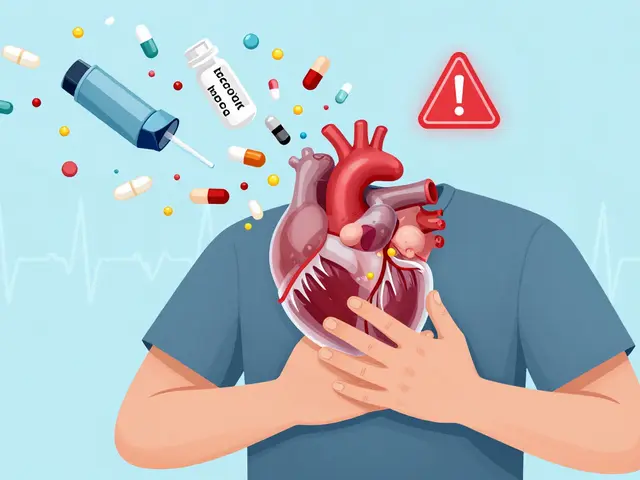 20
May,2023
20
May,2023
Understanding Angina and its Impact on Travel Plans
Angina is a condition that affects many people around the world, and it can significantly impact one's ability to travel and enjoy new experiences. As a blogger who has dealt with angina, I understand the importance of staying safe and healthy while on the go. This article aims to provide helpful tips and advice for those who want to travel with angina, ensuring that they can fully enjoy their adventures without compromising their health.
Preparing for Your Trip: Essential Medical Check-Ups and Precautions
Before embarking on any journey, it's crucial to ensure that your angina is well-managed and under control. Make an appointment with your healthcare provider to discuss your travel plans and undergo a thorough medical check-up. This will help you determine if you are fit for travel and if there are any necessary precautions or medications you should have with you. Your physician may recommend adjusting your medications or even prescribing additional ones to ensure that you remain stable throughout your trip.
Moreover, it's essential to have a well-stocked travel medical kit with you. This should include your prescribed medications, a nitroglycerin spray or tablets for angina relief, and a list of emergency contacts. Additionally, carry a medical ID card or wear a medical alert bracelet that clearly states your angina diagnosis and any other medical conditions you have. This information can be vital in case of an emergency.
Choosing the Right Travel Insurance and Preparing for Emergencies
Traveling with angina comes with certain risks, and it's essential to be prepared for any unforeseen emergencies. Invest in comprehensive travel insurance that covers pre-existing medical conditions, including angina. Ensure that your policy includes coverage for medical expenses, emergency repatriation, and trip cancellation due to health concerns.
It's also essential to research local healthcare facilities at your destination, and keep a list of nearby hospitals and emergency numbers handy. Familiarize yourself with the local language, or have a translation app ready to help you communicate your medical needs clearly if required. Educate your travel companions about your angina diagnosis and instruct them on how to respond in case of an emergency.
Maintaining a Heart-Healthy Lifestyle While Traveling
Keeping up with a heart-healthy lifestyle is crucial when traveling with angina. This includes maintaining a balanced diet that is low in saturated fats and sodium, and rich in whole grains, fruits, and vegetables. Be mindful of portion sizes, and try to avoid overindulging in unhealthy foods. Stay hydrated by drinking plenty of water, and limit your alcohol and caffeine intake as they can trigger angina symptoms.
Physical activity is also essential for heart health. However, it's important to strike the right balance between staying active and not overexerting yourself. Engage in moderate exercises, such as walking or swimming, and avoid high-intensity activities that may strain your heart. Always listen to your body and take breaks as needed. It's also important to manage stress levels while traveling, as stress can exacerbate angina symptoms. Consider practicing relaxation techniques, such as deep breathing exercises, meditation, or yoga, to help you stay calm and focused.
Recognizing Angina Symptoms and Seeking Prompt Medical Assistance
Being able to recognize the signs of angina and seeking prompt medical assistance is crucial when traveling. Common symptoms include chest pain or discomfort, shortness of breath, fatigue, dizziness, and nausea. Keep in mind that angina symptoms can vary from person to person, and it's essential to be familiar with your specific triggers and warning signs.
If you experience angina symptoms while traveling, it's vital to act quickly. Use your nitroglycerin as prescribed to help alleviate symptoms and seek medical attention if your symptoms do not improve or worsen. Remember that it's always better to err on the side of caution and seek help if you're unsure about your condition.
Traveling with angina can be a rewarding experience if you take the necessary precautions and prioritize your health. By following these tips and working closely with your healthcare provider, you can enjoy your adventures while staying safe and healthy on the go.






Oh dear I can just picture the panic when the chest starts thumping like a drum in a parade
the thought of missing a flight because of a pain is a nightmare for any traveler
Man, I feel you – dealing with angina while you’ve got wanderlust is like juggling fireballs on a tightrope.
First off, talk to your doc like a buddy, lay out the itinerary and let them tweak the meds before you even pack your bag.
A little extra nitro in your kit never hurts, just make sure it’s not expired, because nothing ruins a sunrise photo like a busted spray.
Bring a copy of your medical records on your phone and a printed version, you never know if the Wi‑Fi at the airport will cooperate.
Travel insurance? Absolutely, but read the fine print – many policies hide exclusions for pre‑existing stuff like a sneaky cat.
If you can, choose seats with extra legroom so you won’t feel cramped and your blood can flow easier.
Hydration is key, so sip water like it’s your new favorite cocktail, and steer clear of too much caffeine or booze.
When you hit a new city, scout out a pharmacy or clinic ahead of time; Google Maps can be your lifesaver.
Don’t forget to move – a gentle stroll after a long flight beats sitting still like a statue.
And if you feel that pressure building, stop, take a few deep breaths, use your nitro, and give yourself a minute before you keep going.
I’ve seen folks push themselves too hard and end up in the ER, and trust me, that’s not the souvenir you want.
Pack snacks that are low‑salt and low‑fat; chips are tempting but your heart will thank you for the almonds.
If you travel with friends, give them a heads‑up about what to do, so they can help you stay chill if anything spikes.
A little meditation before bedtime can calm the nerves, especially when you’re in a different time zone.
Stay safe, enjoy the sights, and remember that a well‑planned trip can be just as epic as a spontaneous adventure.
Sure, travel insurance is just a scam cooked up by big pharma to keep us scared and buying their junk meds
Indeed, meticulous preparation is paramount for a safe journey 😊. Ensure your medication schedule aligns with time‑zone changes, and keep emergency contacts readily accessible.
Your checklist seems comprehensive.
While the guidelines are well‑intentioned, they insufficiently address the systemic bias of insurers who routinely deny coverage for pre‑existing conditions, thereby undermining the very premise of risk mitigation.
I must say, the notion that a simple list of dos and don’ts can magically shield a heart from all hazards is laughably naive. Travelers often underestimate the cumulative strain of jet lag, irregular meals, and the sheer stress of navigating foreign environments. Moreover, many assume that a medical ID bracelet is a panacea, yet without immediate access to qualified care, it amounts to little more than a decorative accessory. The reality is that proactive monitoring, constant communication with healthcare providers, and realistic expectations about one’s physical limits are the true pillars of safety. Ignoring these factors is not just careless-it borders on reckless, especially when the stakes involve life‑threatening cardiac events. Therefore, a holistic approach, rather than a checklist, should be the cornerstone of any angina‑afflicted traveler’s plan.
Listen, the whole travel hype is a circus of hype and hype‑driven fear‑mongering, and anyone who thinks a nitroglycerin pen will turn you into a superhero is tripping. You need solid prep, not fantasy.
Honestly you should have just stayed home instead of pretending you’re some globetrotting hero, because no amount of fancy tips will fix the fact that your heart is a ticking time‑bomb.
Got a tip: many airports have quiet lounges where you can stretch, hydrate, and keep your meds close – kinda a hidden gem for anyone dealing with heart stuff.
Your reliance on meditation alone is naive; stress management is important, but it cannot replace proper medication adherence and medical supervision.
It's great that you're planning ahead; remember to schedule a follow‑up with your cardiologist before you depart so you can address any concerns and get clearance.
Remember to pack a small cooler for any temperature‑sensitive meds, and always double‑check dosage timings against local meal schedules.
The proposition that nitroglycerin is merely a convenience rather than a critical pharmacologic intervention reflects a profound misunderstanding of cardiovascular pathophysiology and undermines patient safety.
I totally get how stressful this can be, especially when you’re juggling appointments, paperwork, and the excitement of travel – just breathe and take one step at a time.
One must contemplate the epistemological dimensions of itinerant existence, wherein the peripatetic soul contends with both corporeal fragility and the sublime yearning for horizons uncharted.